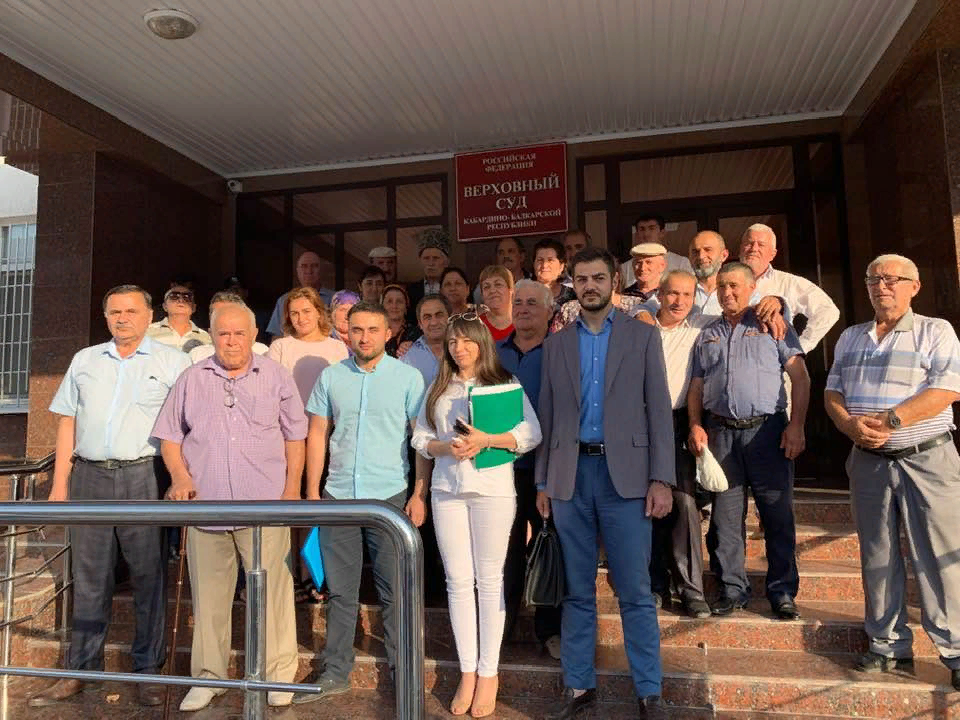
On 23 August, the Supreme Court of the Russian Republic of Kabardino-Balkaria released Martin Kochesoko, who has been under house arrest, on bail. His defence insists that drugs were planted on him and witnesses gave false testimonies.
At the bail hearing on 23 August, Timur Khutov, one of Kochesoko’s lawyers, argued that the case was political.
According to Khutov, Kochesoko was placed under house arrest ‘not because he allegedly possessed drugs, but because the police officers planted them on him in order to disrupt him from the activities he was involved in’.
Khutov told the court that there was ‘no evidence in any of the documents that were examined during the trial’ that Kochesoko could have fled if not placed under house arrest, hence the court’s choice of preventive measure was unjustified.
Kochesoko’s lawyers, as reported by Caucasian Knot, substantiated their demands to change preventive measure by the fact that the investigation has been completed and Kochesoko could no longer influence its outcome.
According to Caucasian Knot, the court ruled that Kochesoko would be released on bail until the trial but would not be allowed to leave Kabardino-Balkaria.
On 27 August, the Human Rights Centre of Kabardino-Balkaria published Kochesoko’s letter to the prosecution where he stated that it was illegal under both international and Russian law to restrict his freedom of movement without a strong reason.
He announced that he would refuse to sign a document preventing him from leaving Kabardino-Balkaria but was instead ready to pledge to appear when summoned to court or to be questioned by police.
Kochesoko also stated that while he was under house arrest, the police were in possession of his phone and changed the passwords to all of his social media and email accounts.
‘At the moment I am not able to control these pages, I am not even able to delete them’, the Human Rights Centre quoted Kochesoko as saying.
‘Pleaded guilty under pressure’
Martin Kochesoko, the leader of Circassian public movement Khabze, was detained on 7 June on his way from the village of Lesken to Nalchik, the capital of Kabardino-Balkaria.
[Read more: Circassian activist Martin Kochesoko arrested in Kabardino-Balkaria on drugs charges]
According to the police, a bag of drugs was found during a search of Kochesoko and his car and on 13 June, the Ministry of Internal Affairs announced that he had pleaded guilty to purchasing and possessing drugs.
At an appeal hearing on 24 June, Kochesoko said he pleaded guilty under pressure from law enforcement.
In June, protests in support of Kochesoko were held in Karachay–Cherkessia’s capital, Cherkessk, the capital of Adygea, Maykop, and in Moscow and Prague. Arsen Kanokov, a senator for Kabardino-Balkaria in the Federation Council, Russia’s upper house of parliament, expressed a readiness to stand for Kochesoko.
On 25 June, the activist was transferred from the pre-trial detention centre to house arrest.
One of Kochesoko’s lawyers, Ruslan Zakalyuzhny, told OC Media that a drug test carried out on Kochesoko showed that he had no traces of illegal drugs in his body .
Fake witnesses
On 2 July, Martin Kochesoko asked the court to carry out polygraph tests on two witnesses, identified only as Vyblov and Mkrtumyan. The two men were present during the search of his car at the time of the detention. He expressed suspicion that they were fake witnesses hired by the police.
The Human Rights Centre of Kabardino-Balkaria quoted Zakalyuzhny as saying that during a face-to-face police interview with Kochesoko and Mkrtumyan, Mkrtumyan admitted that he and Vyblov had been repeatedly engaged by the police as witnesses.
Zakalyuzhny told Kavkaz.Realii that Vyblov and Mkrtumyan were subordinate to the investigators, having previously served time in prison, ‘and just because of that they cannot be witnesses’.
On 5 August, the Urvan District Court of Kabardino-Balkaria, in the jurisdiction of which Kochesoko was detained, rejected the lawyers’ plea to change Kochesoko’s preventive measure and extended his house arrest for two months.
At a hearing of the Supreme Court of Kabardino-Balkaria on 23 August, Khutov said that the testimonies of these two witnesses were identical. According to him, even grammatical errors in their statements were the same, suggesting they copied their statements from a single file.
‘The planting of drugs and the involvement of witnesses dependent on the investigation indicate the cynicism with which the case against our client was fabricated’, Zakalyuzhny told OC Media.
‘A directive from above’
After Kochesoko’s release from house arrest, calls appeared on social networks to prosecute the police officers who participated in the ‘falsification’ of his case.
Lawyer Tamerlan Tambiyev told OC Media that ‘the likelihood of this [drug] planting being proved is negligible, since the falsification of the Kochesoko’s case is, of course, not the initiative of the executors of the detention and arrest’.
Tambiyev claimed that the case was the initiative of high-level officials at the Ministry of Internal Affairs and that these officials would not allow the falsification to be recognised by a court.
According to Tambiyev, Kochesoko’s trial will end either with acquittal or with a suspended sentence. He speculated that the court would rule that there was no falsification but that violations of search procedures, witness interviews, and the charging process did take place.




 28 August 2019
28 August 2019


